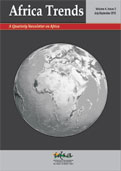Radicalisation in South East Africa: A case study of Mozambique
The distinct feature of radicalisation in Mozambique is that local issues enable the Ansar ul Sunna to conduct its nefarious activities. So rather than take a hard approach, it would serve the Government well to address the growing local concerns of unemployment, social exclusion and underdevelopment in order to curb the influence of Islamic extremism in Mozambique.
- Mathew Sinu Simon
- January-June 2018








